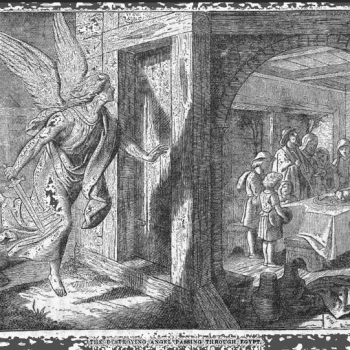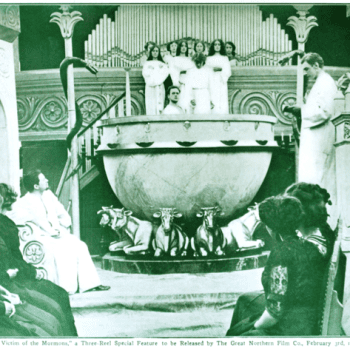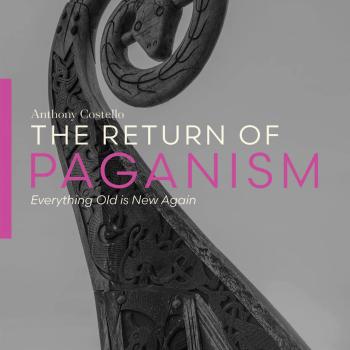There are some bedrock facts about Jesus Christ that all people, regardless of theological or political persuasion, must confront. One of these is the historical fact that Jesus of Nazareth was a man. This is indisputable, whether Jesus was God incarnate or, as the pantheist Spinoza claimed, merely the greatest philosopher to ever live (“Christum ait fuisse summum philosophum”). Either way, Jesus was male. This means that there is at least something we might call “biblical manhood,” since most of what we know about Jesus is in the Bible and, again, since He was male. Now, if Jesus was also God, this would entail that God chose to become a man and not a woman, or a house plant or a hedgehog. Even for Spinoza then, the manifestation of the Christ, who is, like all things on Spinoza’s account, god, was still a male manifestation of the divine One.
From an orthodox perspective, however, if the transcendent, creator God chose to become a man, then this male incarnation was a choice made from all eternity, even prior to the creation of men. Of course, being all-powerful, God could have intended to incarnate as a woman. But God did not do so. Moreover, if God is all-wise, as all faithful Christians agree, then God’s choice to become Jesus of Nazareth, and not Johanna of Nazareth, must have been the wisest of all possible incarnational choices. It is a choice, at least for those who care, that we should humbly accept as the finite and flawed creatures we are.
A Fact Not To Be Taken Lightly
This historical fact should raise very serious questions for all Christians, but, most especially, for Christian men. Some of these questions are not comforting. Instead they can be quite anxiety-inducing– and perhaps they are meant to be. For if God became not only “man,” in the general sense of “human,” but also “man” in the sense of the embodied, sexed part of the human species that possesses an “XY” chromosomal pattern, then biological men should feel a special burden of what it means to “be like Christ.” For to be like Christ would also entail being a man like Jesus. Further, to be a man like Jesus would seem to be quite a tall order, given that Jesus is also God. Nevertheless, it is an order regardless of how tall it is.
And so, just to make things harder, let’s elucidate 5, no 6, characteristics (there are certainly more) that reflect what it means to be manly like Jesus. In no particular order then, here are 6 features of biblical manhood.
#1 The Godly Man Judiciously Restrains His Own Power
53 Do you think I cannot call on my Father, and he will at once put at my disposal more than twelve legions of angels?
Jesus, Matt 26:53
Years ago I participated in a Bible study of devout Christian men serving in an eastern province of Afghanistan. These men were members of a unit commonly known in the United States Army as the “Ranger Bat,” which is short for Ranger Battalion. Their role was simple: to find, fix, and finish Taliban fighters. I had great regard for these men both as soldiers and as brothers in Christ. That is why at one point in the conversation, I brought up a concern. The concern was not so much over the vocation they had been called to fulfill, but over what that vocation could eventually lead to if not careful: namely, an injudicious use of real power.
In such circumstances like war, the use of power is obvious, since it is physical and explicitly aimed at a clearly defined target, often a human target. Not being a pacifist, I understood and supported the role of these men (and my own role as a fellow soldier, the “EAD” portion of F3EAD) in carrying out what was arguably a just use of violence. But, as Christians, I simply reminded them, and myself, that this use of power was entirely contingent upon living in a sin-fallen world. It was not, nor ever meant to be, the norm. Moreover, in other contexts (almost all in fact), it would be not the use of power, but the restraint of power that would demonstrate to the world our true identities as followers of Jesus.
Christ Himself models for us the greatest example of power restrained when He goes to the cross unjustly and, out of sacrificial love, refrains from calling down legions of angels to punish that which is most wicked and worthy of punishment, the (intended) destruction of that which is entirely Holy (here, Christ’s own body). The godly man, therefore, is one who knows when, why and how to restrain his own power and refrain from using it, even when it seems like it might be most called for. This is the heart of mercy, and the human application of divine grace.
#2 Biblical Manhood Loves & Cares For Children
People were also bringing babies to Jesus for him to place his hands on them. When the disciples saw this, they rebuked them. But Jesus called the children to him and said, “Let the little children come to me, and do not hinder them, for the kingdom of God belongs to such as these. Truly I tell you, anyone who will not receive the kingdom of God like a little child will never enter it.
Luke 18:15-17
Men have been falsely accused of many things over the years by feminists. The most ridiculous of which is just being men at all. However, there is a trenchant critique of men that even the Bible hints at over and over again. That is the failure of men to properly love and care for their children (just consider David’s relationships with his sons, or the moral character of Solomon’s children). Moreover, given the socially devastating epidemic of fatherlessness in our own culture, it seems clear that, in general, men’s nature has to be redeemed of their inclination to neglect the caring for and raising of children (and the enjoyment of doing so).
While Jesus does not explicitly endorse marriage as a necessity, and certainly not Paul, godly men who do marry will desire to have and raise children, often many children. The having and raising of children not only mirrors Christ’s love of children and great concern for them, but also acts as the primary means for a married man to be sanctified. For in experiencing the trials and triumphs of our children, we learn most tangibly, most experientially, about the heart of the Father for His only-begotten Son. In being fathers ourselves, the nature of the Father is made more manifest to us.

Of course, for those who cannot have children, or who choose to remain single, there are other means to knowledge of the Father. No one who truly desires to know God is excluded from His presence. Nevertheless, all godly men will have a divine inclination to care for, guide and protect children, whether their own biological children, adopted children, or the children of friends and family members. Those men who dislike children, avoid them, or who are married yet intend to not have them, should strongly reconsider what it means to follow Christ.
#3 The Godly Man Endures Physical Pain Well
He was oppressed and afflicted,
Yet He did not open His mouth;
Like a lamb that is led to slaughter,
And like a sheep that is silent before its shearers,
So He did not open His mouth.Isa 53:7
And when we experience pain, just as Christ experienced it in the fullness of His body, should we also then not stay silent and refrain from crying out? To endure physical pain may be the most concrete and obvious characteristic of masculinity. This applies especially to cases of pain that are inflicted out of malevolence at the hands of bad moral agents (something qualitatively different from the kind of pain a woman must endure in child birth, which is, or at least should be, a mixture of physical pain and joyful expectation).
Peter seems to imply this trait of the godly man when he speaks of women being the weaker vessels (1 Peter 3:7):
7 Likewise, husbands, live with your wives in an understanding way, showing honor to the woman as the weaker vessel, since they are heirs with you of the grace of life, so that your prayers may not be hindered.
The only theologically appropriate, and anthropologically accurate, interpretation of this passage is also the most obvious one: that wives (women) are physically weaker than husbands (men). Other commentators have suggested ways in which women might be weaker than men, for example, emotionally or intellectually. But these conjectures are demonstrably false. At the same time, it is demonstrably true that women are generally the weaker vessel physically. As such, it is the burden of the godly man to take on as much of the physical burden of life as possible, and, subsequently, to not complain about doing so, just as Christ did not complain about His physical sufferings, sufferings far more tremendous than most of us are called to endure.
#4 Biblical Manhood Avoids Luxury
And Jesus said to him, “The foxes have holes and the birds of the sky have nests, but the Son of Man has nowhere to lay His head.”
Matt 8:20
Paul, writing to his disciple Timothy, reinforces the dominical abhorrence of wealth and luxury when he says, “Love of money is the root of many evils” (1 Tim 6:10). For the Christian man, wealth in itself is not the problem, rather the use of wealth is what matters. Money, material goods, in general what Jesus called “mammon” (Matt 6:24) is only as good as what it is used for. The godly man does not pursue wealth for its own sake, nor does he waste it frivolously on objects designed merely for pleasure, comfort or status. Expensive clothing, houses, cars, vacations, jewelry etc., are not important to the godly man. In fact, he thinks nothing of them, not spending a single amount of mental energy on how to attain them. The godly man pursues modesty in his lifestyle, never excess, nor, for that matter, self-flagellating discomfort.
The Church Father, Clement of Alexandria, further draws out the implications of a Christ-honoring life with regard to luxury, writing in the 3rd century:
We must then exercise ourselves in taking care about those things which fall under the power of the passions, fleeing like those who are truly philosophers such articles of food as excite lust, and dissolute licentiousness in chambering and luxury; and the sensations that tend to luxury, which are a solid reward to others, must no longer be so to us. For God’s greatest gift is self-restraint.
Clement of Alexandria, The Stromata Book II, Chapter 20
St. Augustine reiterates his predecessor’s concern when he addresses finite and transient things the soul can attach itself to, and, in doing so, so lose connection to God:
For wherever the soul of man may turn, unless it turns to you, it clasps sorrow to itself. Even though it clings to things of beauty, if their beauty is outside God and outside the soul, it only clings to sorrow….In these things there is no place to rest, because they do not last. They pass away beyond the reach of our senses. Indeed, none of us can lay firm hold of them even when they are with us. For the senses of the body are sluggish, because they are the senses of flesh and blood. They are limited by their own nature. They are sufficient for the purposes for which they were made, but they cannot halt the progress of transient things, which pass from their allotted beginning to their allotted end.
Augustine, Confessions, Book IV.10
In sum, the next time you attend a church where the pastor drives a Ferrari or sports a Brioni jacket, seriously reconsider any future visits.
#5 The Godly Man Tempers His Emotions
Jesus wept.
John 11:35
41 And when he was come near, he beheld the city, and wept over it,
Luke 19:41
In the Gospels, we have two accounts of Jesus weeping (a third, more general account, is given in Hebrews 5:7-9). One is for His friend, Lazarus, who has died. The other is for the holy city, Jerusalem. Both are cries of lament: one for the fragility of the human body corrupted by sin, and the other for the human society corrupted by sin. In both cases, Jesus’ emotions are appropriate. Indeed, they are ordered in the most righteous and just of all possible ways: genuine grief over realities that God did not desire in His perfect will, but allowed for permissively given His gift of genuine human freedom.
Of course, Jesus shows other emotions than sorrow: anger (Matt 23:33; John 2:13-17), exhaustion (Mk 6:31), frustration (Matt 17:14-20), agony (Luke 22:39-45) and, of course, compassion (John 19:25-27). What is noticeable, however, is that Jesus, being the man of virtue (or, better said, the embodiment of virtue) is always in control of His emotions. He does not get angry to the point of disproportionate response, as we do. Nor does His compassion for the hurt and broken override their free will, becoming controlling and manipulative, as our’s often does. Nor does His grief or sorrow devolve into despair, as our grievances and our sorrows too often do.
Thus, it is the godly man who learns to have mastery over his emotions. This is not a neglect of emotions, but an appropriate ordering and prioritizing of them, followed by an always temperate display. Much, much damage is done to human souls when men are not in mastery over their feelings, the most obvious victims being women and children (see point #2 above).
#6 Biblical Manhood Submits to Higher (and Proper) Authority
So Jesus said, “When you lift up the Son of Man, then you will know that I am, and I do nothing on My own, but I say these things as the Father instructed Me.
John 8:28
No one has taken it away from Me, but I lay it down on My own. I have authority to lay it down, and I have authority to take it back. This commandment I received from My Father.
John 10:18
The man who follows Christ submits to a higher authority. First and foremost to God almighty, who was, and is, and always will be the highest authority. However, the godly man also seeks to honor the incarnate Christ by submitting himself to proper authorities within the world–immanent authorities that come and go as history progresses. While the moral conditions of a particular context must always be taken into account, in principle godly men will try to place themselves freely under relevant authorities. The godly man is no rebel; he will be the best of citizens in a given nation, because he will submit, in general, to the civic authorities and laws of the land (Romans 13:1-7).
In other, pre-political and pre-civic relationships, the Christian man will also freely submit to appropriate authorities. Younger men will defer to older men. Employees will obey their employers and adhere to the standards and norms of the companies they work for. Students will submit to teachers, congregants to pastors, citizens to law enforcement, Christian soldiers to their officers. Our voluntary submission to authority reflects Christ’s own voluntary deference to the authority of the Father, a deference which entailed His laying aside the authority rightly His as the ontologically equal Son (Phil 2:5-8).
However, there are exceptions to this principle of godly manhood. If authority is imposed from above, in such a way that there is not an opportunity to freely submit oneself to that authority, or if the authority in question is clearly in opposition to the authority of God (usually in the form of God’s moral law), then the godly man must, in fact, not submit but resist submission. For the godly man cannot be caught up in what is evil. As such, the opportunity to say “they made me do it,” can never be a reality for the godly man. In this sense, the godly man must never be a rebel, or a revolutionary, but, he may often be called to be a reformer and, if need be, a martyr.
Epilogue: A Word About David
Most readers will notice I used a photo of Michelangelo’s David as the featured image for this article. I did this for a few reasons: one, because it is simply an artistic masterpiece and always worth looking at. Second, because it was a good photo of the statue. Third, however, is the fact that David is often referenced by Evangelicals as an example of “biblical manhood.” However, that is problematic. My only reference to David in this article, under point #2, was a negative one. However, in spite of David’s epic failures with regards to points #1, #2, #4 and #5, there is one characteristic of manhood that, after Christ, David is almost the paradigmatic example. That is in point #6, his consistent return and submission to the authority of God in lieu of his sins (Psalm 51). It is this, in fact, that distinguishes David from his predecessor Saul, making him a biblical hero, and not a villain, in spite of his many villainous acts.
That said, it may be the case, and likely is, that of all these manly characteristics without #6 the rest are indeed worthless.


















